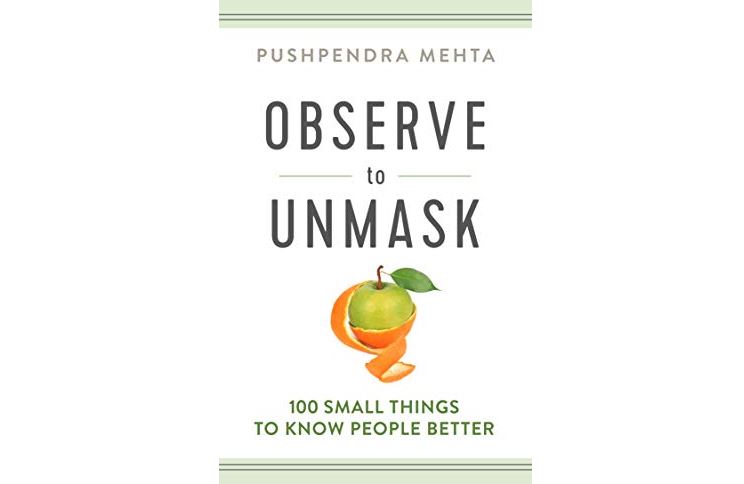BY JYOTHSNA HEGDE
One of my fondest memories from my Engineering days is a group of us friends, who had read and memorized every little detail of Linda Goodman’s Sun Signs, gather and analyze college characters to “unmask” their sun sign based on their behavior. Maybe if I had put in that much energy and dedication into Electronic Circuit Design, my story would’ve turned out differently. But I wouldn’t change a thing. Especially the joy of being able to observe human behavior to unveil a person’s sun sign. Yes, it is but compelling for one human being to be able to comprehend and recognize another person’s innermost character based on their external behavior, which is on display for everyone to see. Author Pushpendra Mehta picks up on this very keen indulgence of people to put together some interesting insights in his self-help guide, Observe to Unmask: 100 Small Things to Know People Better.
Inspired by responses to his answer on Quora about what a small thing can tell you about a person, Mehta decided to build upon the idea.
“Most of us have four sides to our personality. One we keep hidden inside. The second is what we show our immediate family, partner, best friend, and household staff. The third is exhibited in front of extended family, close friends, peers, colleagues, and coworkers; and the fourth is presented to the rest of the world,” observes Mehta. His attempt, as he puts it, is to uncover the person behind these masks.
According to Mehta, studying the first 18 to 21 years of a person’s life sheds plenty of valuable insights about an individual. This, I must admit, as I reflected upon my own character, actually turns out be absolutely true! The imprints of adolescence and young age do tend to structure so much of adult behavior.
Presented in the first person and divided into 15 chapters, Mehta kicks off with, “What We Lack, We Pursue.” The author notes that sensitive people often understand and unmask people better. The key to better interpersonal communication, he says, are observation and a conscious effort to train yourself to pick up on subtle, often unspoken hints people convey about themselves through mannerisms, and especially social media posts. Especially in the digital era, where social media tends to be a source of information (overload, most times), it is important to note what they don’t say, he notes. Mehta covers various topics such as what people say about money and what that implies about their character, and what sense of humor says about a person.
As you graze through the chapters, it becomes apparent that there are plenty of observations you already know, but somehow have not recognized its significance. This book quantifies most of our own experiences into words. The reader can relate these observations to unmask his/herself and then it serves to understand oneself better, to be self-aware.
Human heart and psyche are hard to comprehend. So, there are a few generalizations that may or may not apply to everyone, but Mehta does a great job of summarizing the complexities of human behavior without bringing in the science behind it, as he states right at the preface, “This book is not backed by data or scientific evidence. It is based on my experience and intuitive insights. You are welcome to accept, condone, reject, or condemn my observations. I can only urge you to arrive at your own conclusion.”
Presented in a very easy-to-read and precise manner, this book can help you understand why people mask themselves, and maybe even you, under some circumstances. With plenty of references to character identification and analysis, this book helps you identify people who maybe manipulating you.
Mehta wraps up on a reflective tone, highlighting Karma, which constitutes our habits, words, actions, and thoughts. “The karma currency grows every moment, every day in our karmic bank account regardless of the effects of our good or bad deeds,” notes Mehta, concluding that choice is always ours. “We have the freedom to choose our beliefs, habits, words, actions, and thoughts, but we do not have the freedom to choose its outcome, result, or consequences. Choose wisely. Remember “For every action, there is an equal and opposite reaction. As you sow, so shall you reap. If you plant the thorny acacia tree (babul tree) how can you reap mangoes?” Now, that’s an observation no one needs to unmask.

Author Info:Pushpendra Mehta is the author of “The Suitable Inheritor” (novel) and nonfiction books “OBSERVE to UNMASK: 100 Small Things to Know People Better,” “Win the Battles of Life & Relationships,” and “Tomorrow’s Young Achievers,” which have earned him an internationally loyal readership. The richness of his experience comes from having donned diverse roles – writer, storyteller, marketer, and mentor to offer solutions to problems.
Pushpendra was raised in India and now lives in Atlanta, USA. He is an alumnus of Northwestern University, IL., and Sydenham College of Commerce & Economics. His interests include reading, writing, tennis, golf, travel, movies and music.





